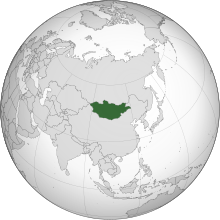
Back معاملة المثليين في منغوليا Arabic Drets del col·lectiu LGBT a Mongòlia Catalan LGBT práva v Mongolsku Czech Homosexualität in der Mongolei German Diversidad sexual en Mongolia Spanish Droits LGBT en Mongolie French זכויות להט"ב במונגוליה HE Hak LGBT di Mongolia ID Diritti LGBT in Mongolia Italian モンゴル国におけるLGBTの権利 Japanese
LGBTQ rights in Mongolia | |
|---|---|
 | |
| Status | Legal since 1993 |
| Gender identity | Transgender people permitted to change legal gender marker following a medical procedure to affirm their gender |
| Military | Lesbians, gays, bisexuals permitted, transgender people banned[1] |
| Discrimination protections | Some level of protection for both sexual orientation and gender identity |
| Family rights | |
| Recognition of relationships | No |
| Restrictions | Same-sex marriage constitutionally banned since 1992 |
| Adoption | No |
Lesbian, gay, bisexual, transgender, and queer (LGBTQ) people in Mongolia face legal and social challenges not experienced by non-LGBTQ people, though there have been substantial improvements since the 1990s. Homosexuality was criminalised in Mongolia in 1961 through its Criminal Code. Following the Mongolian Revolution of 1990 and the peaceful transition to a democracy, homosexuality was legalised and awareness about LGBTQ people has become more prevalent. Hate crimes on the basis of sexual orientation and gender identity result in additional legal penalties. Hate speech based on these two categories has been outlawed in the country since 1 July 2017.[2] Households headed by same-sex couples are, however, not eligible for the same legal protections available to opposite-sex couples.
The LGBT Centre (active since 2007) states "advocacy for the human rights of lesbian, gay, bisexual and transgender people in Mongolia" to be its mandate. It is the main engine behind the policy and legislative changes in the country around LGBTQ rights.[3] Historically, the first gay men's human rights organisation was established in March 1999, and was called Tavilan (meaning "destiny" in Mongolian).
- ^ "LGBT Rights in Mongolia". Equaldex. Retrieved 14 December 2023.
- ^ "Эрүүгийн хууль, 2015 он".
- ^ "Нүүр | ЛГБТ Төв | The LGBT Centre". ЛГБТ Төв | The LGBT Centre. Retrieved 20 September 2017.